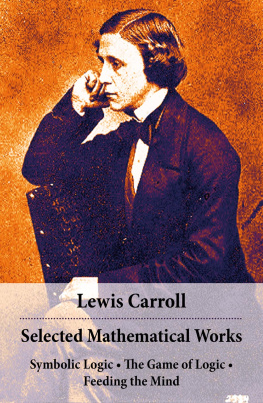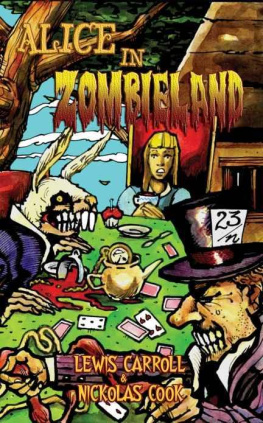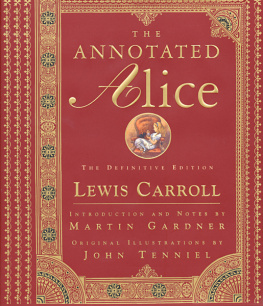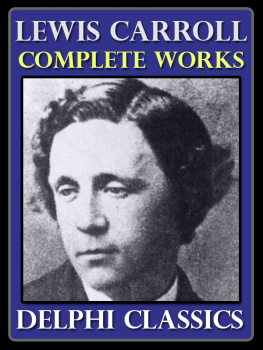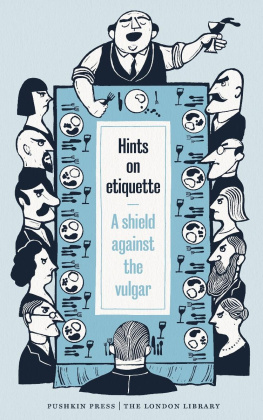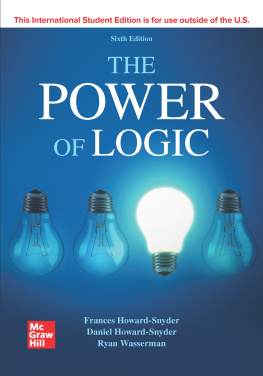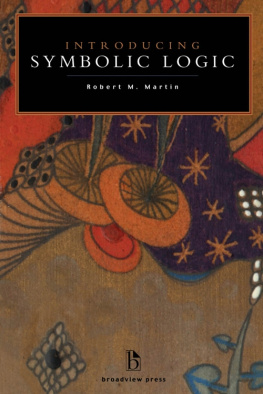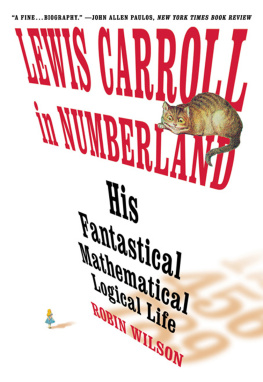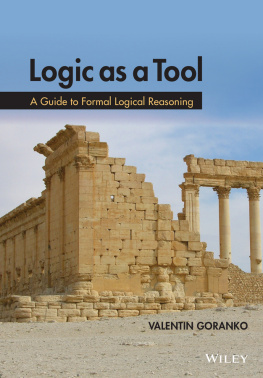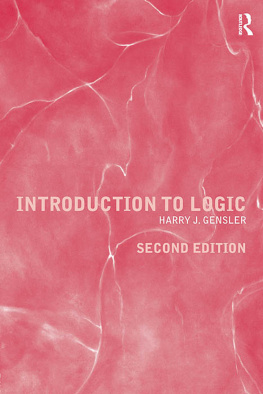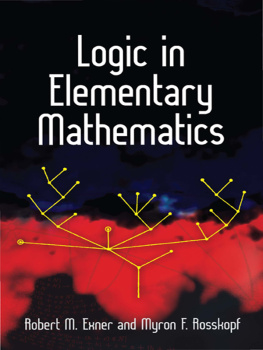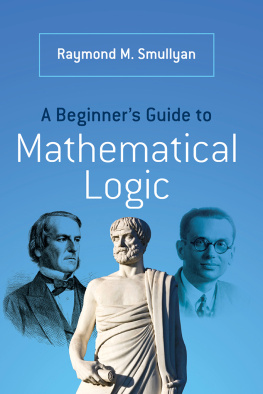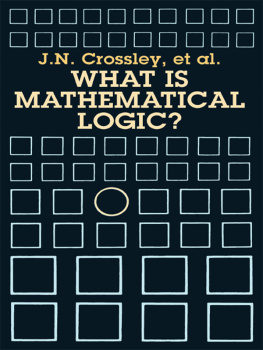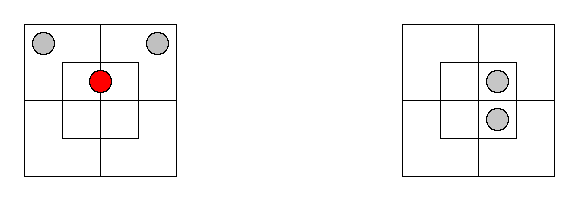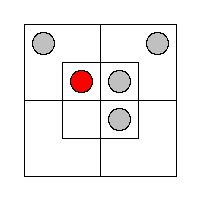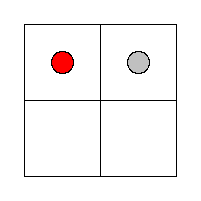A Syllogism worked out.
--------------------------
That story of yours, about your once meeting the sea-serpent, always sets me off yawning;
I never yawn, unless when Im listening to something totally devoid of interest.
---------------------------
The Premisses, separately.
The Conclusion.
That story of yours, about your once meeting the sea-serpent, is totally devoid of interest.
PART I
ELEMENTARY
PREFACE TO THE FOURTH EDITION.
The chief alterations, since the First Edition, have been made in the Chapter on Classification (.
In Book I, Chapter II, I have adopted a new definition of Classification, which enables me to regard the whole Universe as a Class, and thus to dispense with the very awkward phrase a Set of Things.
In the Chapter on Propositions of Existence I have adopted a new normal form, in which the Class, whose existence is affirmed or denied, is regarded as the Predicate, instead of the Subject, of the Proposition, thus evading a very subtle difficulty which besets the other form. These subtle difficulties seem to lie at the root of every Tree of Knowledge, and they are far more hopeless to grapple with than any that occur in its higher branches. For example, the difficulties of the Forty-Seventh Proposition of Euclid are mere childs play compared with the mental torture endured in the effort to think out the essential nature of a straight Line. And, in the present work, the difficulties of the 5 Liars Problem, at , are trifles, light as air, compared with the bewildering question What is a Thing?
In the Chapter on Propositions of Relation I have inserted a new Section, containing the proof that a Proposition, beginning with All, is a Double Proposition (a fact that is quite independent of the arbitrary rule, laid down in the next Section, that such a Proposition is to be understood as implying the actual existence of its Subject). This proof was given, in the earlier editions, incidentally, in the course of the discussion of the Biliteral Diagram: but its proper place, in this treatise, is where I have now introduced it.
In the Sorites-Examples, I have made a good many verbal alterations, in order to evade a difficulty, which I fear will have perplexed some of the Readers of the first three Editions. Some of the Premisses were so worded that their Terms were not Specieses of the Univ. named in the Dictionary, but of a larger Class, of which the Univ. was only a portion. In all such cases, it was intended that the Reader should perceive that what was asserted of the larger Class was thereby asserted of the Univ., and should ignore, as superfluous, all that it asserted of its other portion. Thus, in Ex. 15, the Univ. was stated to be ducks in this village, and the third Premiss was Mrs. Bond has no gray ducks, i.e. No gray ducks are ducks belonging to Mrs. Bond. Here the Terms are not Specieses of the Univ., but of the larger Class ducks, of which the Univ. is only a portion: and it was intended that the Reader should perceive that what is here asserted of ducks is thereby asserted of ducks in this village. and should treat this Premiss as if it were Mrs. Bond has no gray ducks in this village, and should ignore, as superfluous, what it asserts as to the other portion of the Class ducks, viz. Mrs. Bond has no gray ducks out of this village.
In the Appendix I have given a new version of the Problem of the Five Liars. My object, in doing so, is to escape the subtle and mysterious difficulties which beset all attempts at regarding a Proposition as being its own Subject, or a Set of Propositions as being Subjects for one another. It is certainly, a most bewildering and unsatisfactory theory: one cannot help feeling that there is a great lack of substance in all this shadowy hostthat, as the procession of phantoms glides before us, there is not one that we can pounce upon, and say Here is a Proposition that must be either true or false!that it is but a Barmecide Feast, to which we have been biddenand that its prototype is to be found in that mythical island, whose inhabitants earned a precarious living by taking in each others washing! By simply translating telling 2 Truths into taking both of 2 condiments (salt and mustard), telling 2 Lies into taking neither of them and telling a Truth and a Lie (order not specified) into taking only one condiment (it is not specified which), I have escaped all those metaphysical puzzles, and have produced a Problem which, when translated into a Set of symbolized Premisses, furnishes the very same Data as were furnished by the Problem of the Five Liars.
The coined words, introduced in previous editions, such as Eliminands and Retinends, perhaps hardly need any apology: they were indispensable to my system: but the new plural, here used for the first time, viz. Soriteses, will, I fear, be condemned as bad English, unless I say a word in its defence. We have three singular nouns, in English, of plural form, series, species, and Sorites: in all three, the awkwardness, of using the same word for both singular and plural, must often have been felt: this has been remedied, in the case of series by coining the plural serieses, which has already found it way into the dictionaries: so I am no rash innovator, but am merely following suit, in using the new plural Soriteses.
In conclusion, let me point out that even those, who are obliged to study Formal Logic, with a view to being able to answer Examination-Papers in that subject, will find the study of Symbolic Logic most helpful for this purpose, in throwing light upon many of the obscurities with which Formal Logic abounds, and in furnishing a delightfully easy method of testing the results arrived at by the cumbrous processes which Formal Logic enforces upon its votaries.
This is, I believe, the very first attempt (with the exception of my own little book, The Game of Logic, published in 1886, a very incomplete performance) that has been made to popularise this fascinating subject. It has cost me years of hard work: but if it should prove, as I hope it may, to be of real service to the young, and to be taken up, in High Schools and in private families, as a valuable addition to their stock of healthful mental recreations, such a result would more than repay ten times the labour that I have expended on it.
L. C.
29, Bedford Street, Strand.
Christmas, 1896.
INTRODUCTION.
TO LEARNERS.
[N.B. Some remarks, addressed to Teachers, will be found in the Appendix, at .]
The Learner, who wishes to try the question fairly, whether this little book does, or does not, supply the materials for a most interesting mental recreation, is earnestly advised to adopt the following Rules:
(1) Begin at the beginning, and do not allow yourself to gratify a mere idle curiosity by dipping into the book, here and there. This would very likely lead to your throwing it aside, with the remark This is

